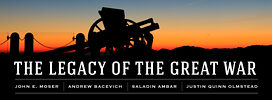Lead Essay
John E. Moser notes the strong initial appeal that the First World War held for Progressives. Many of them believed that war showed how the federal government could and should undertake a general refashioning of society. Indeed it did; while the United States did not turn socialist, as some progressives hoped, the federal government did vastly expand in scope and authority. The Progressives’ ideal of the permanent war footing, in which all relevant resources are put under unified federal control to achieve one or more pressing social ends, has been with us ever since.
Response Essays
Justin Quinn Olmstead looks at a time when U.S. engagement with the world wasn’t a given, and when the world needed the United States a lot more than we needed it. That time was immediately after World War I. He characterizes World War I as “only the prelude” to a state of affairs that has been with us for decades now, namely, a constant war footing that was formerly unknown in American society.
Andrew Bacevich argues that World War I changed the ways that western powers justified imperialist foreign policy. Prior to the war, imperial powers offered a frankly white supremacist rationale for their actions, but that rationale rang hollow when Europe lay in ruins. Later empires would need other justifications, including the ideological ones offered by systems as divergent as Marxism-Leninism and liberal market democracy. Yet these ideological empires have proven unstable, and our uncertain future may only be settled by whatever it is that replaces them.
Saladin Ambar describes early progressives’ infatuation with war as “a Faustian bargain” that they eventually repudiated, driven substantially by the example of World War I. Not only did the war not bring economic empowerment, it also dashed the hopes of many who looked for it to bring racial justice. The state that the war created was simply not what progressives wanted it to be, whether before the war—or especially after.
Coming Up
Discussion through the end of the month.

